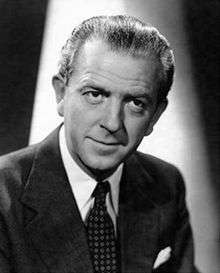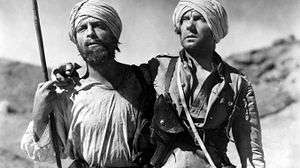John Clements (actor)
| Sir John Clements CBE | |
|---|---|
 John Clements in 1954 | |
| Born |
25 April 1910 London, England, UK |
| Died |
6 April 1988 (aged 77) Brighton, Sussex, England, UK |
| Years active | 1935–1982 |
| Spouse(s) |
|
Sir John Selby Clements, CBE (25 April 1910 – 6 April 1988) was an English actor and producer who worked in theatre, television and film.
Biography
Theatre career
Clements attended St Paul's School and St John's College, Cambridge[1] then worked with Nigel Playfair and afterwards spent a few years in Ben Greet's Shakespearean Company. He made his first stage appearance in 1930. Clements founded the Intimate Theatre at Palmers Green in 1935, which is a combined repertory and try-out theatre. He appeared in almost 200 plays, and presented a number of plays in the West End as actor-manager-producer. Clements was the artistic director of the Chichester Festival Theatre from 1966 to 1973.
In December 1951 he directed Man and Superman at the Wimbledon Theatre, Surrey, and played the role of John Tanner alongside Allan Cuthbertson. He married the actress Kay Hammond and together they became a critical success with their West End revival of Noël Coward's play Private Lives in 1945. In 1952 they both appeared in Clements' own play The Happy Marriage, an adaptation of Jean Bernard-Luc's Le Complexe de Philemon. Clements starred as Edward Moutlon Barrett in the musical Robert and Elizabeth, a successful adaptation of The Barretts of Wimpole Street. His stepson is the actor John Standing.
Film career

As a film actor John Clements played bit parts of increasing size for Alexander Korda's London Films in the 1930s. He made quite an impression opposite Robert Donat and Marlene Dietrich in Knight Without Armour as Poushkoff, an over-sensitive commissar who saves their lives during the Russian Revolution. He came to further prominence when film director Victor Saville chose him to star opposite Ralph Richardson in South Riding (1938). The two actors were reunited in the very successful The Four Feathers (1939).
After this, Clements' film career was somewhat intermittent, although he made a series of British war films for Ealing Studios and British Aviation Pictures, such as Convoy (1940), Ships with Wings (1942), Tomorrow We Live (1943) and as Yugoslav guerrilla leader Milosh Petrovitch in Undercover (1943). He had a cameo role (as Advocate General) in Gandhi (1982).
Clements was made a Commander of the Order of the British Empire (CBE) in 1956 and was knighted in 1968. He died in Brighton, East Sussex, in 1988.
Filmography
- The Divine Spark (1935) as Florino
- Once in a New Moon (1935) as Edward Teale
- Ticket of Leave (1936) as Lucky Fisher
- Things to Come (1936) as The Airman (uncredited)
- Rembrandt (1936) as Govaert Flinck
- Knight Without Armour (1937) as Poushkoff
- I, Claudius (1937) as Valente
- South Riding (1938) as Joe Astell
- Housemaster (1938) as Undertermined Minor Role (uncredited)
- Star of the Circus (1938) as Paul Houston
- The Four Feathers (1939) as Harry Faversham
- Convoy (1940) as Lieutenant Cranford
- This England (1941) as John Rookeby
- Ships with Wings (1942) as Lieutenant Dick Stacey
- Tomorrow We Live (1943) as Jean Baptiste
- Undercover (1943) as Milosh Petrovitch
- They Came to a City (1944) as Joe Dinmore
- Call of the Blood (1949) as Julius Ikon
- Train of Events (1949) as Raymond Hillary (segment "The Composer")
- The Silent Enemy (1958) as The Admiral
- The Mind Benders (1963) as Major Hall
- Oh! What a Lovely War (1969) as General Helmut von Moltke
- Gandhi (1982) as Advocate General
- Top Secret! (1984) as East German Dignitary (uncredited) (final film role)
References
- ↑ "Sir John Selby Clements". Person Page - 18344. thepeerage.com. 3 February 2006. Retrieved 30 March 2011.
External links
- John Clements on IMDb
- John Clements archive at the University of Bristol Theatre Collection, University of Bristol